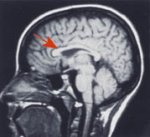
Traditionally, religious and non-religious thinkers promoted the idea that everyone had a “soul” or “ghost in the machine” that controlled the person’s higher functions. It is not unusual for most of us to feel that there is a single “I” in control, however, neuroscience has challenged this. It has put forward the idea that the self aside from being an illusion that the brain works hard to produce, is actually a network of brain systems.1
The first hints of this occurred after a 19th century fellow, Phineas Gage, suffered an injury by having a spike go through his cheek and through his brain. Phineas’s perception, memory, language and motor functions were intact, but “Gage was no longer Gage.” He had turned from a courteous, responsible and ambitious person to one who was rude, unreliable and shiftless. Gage’s damage was to his ventromedial prefrontal cortex (the brain region above the eyes now known to be involved in reasoning about other people. Together with other areas of the prefrontal lobes and the limbic system (the seat of the emotions), it anticipates the consequences of one’s actions and selects behaviour in line with one’s goals.
Neuroscientists have shown that the brain does not even have a part that does what the ghost is supposed to do – review all the facts and make a decision for the rest of the brain to carry out. While the brain does have supervisory systems in the prefrontal lobes and anterior cingulated cortex, which can push the buttons of behaviour and override habits and urges, these systems are more like quirky gadgets that are quite limited. They are not implementations of a rational free agent traditionally identified with the soul or self.
A demonstration of the illusion of the unified self
Michael Gazzaniga and Roger Sperry showed that when one cuts the corpus callosum (the bridge between both hemispheres), they literally cut the self in two.
 {MRI by Dr. Ed Riley, San Diego University}
{MRI by Dr. Ed Riley, San Diego University}Each hemisphere can exercise free will without the other’s advice or consent.
Even more disconcertingly, the left hemisphere continuously weaves a coherent but false account of behaviour chosen by the right hemisphere (without the left’s knowledge).
For example, if an experimenter flashes the command “WALK” to the right hemisphere (by keeping it in the part of the visual field that only the right hemisphere can see), the person will comply with the request and begin to walk out of the room. But when the person (specifically, the person’s left hemisphere) is asked why he just got up, he will say in all sincerity, “To get a Coke” – rather than “I don’t really know” or “The urge just came over me” or “You’ve been testing me for years since I had the surgery, and sometimes you get me to do things but I don’t know exactly what you asked me to do.”
Similarly, if the patient’s left hemisphere is shown a chicken and his right hemisphere is shown a snowfall, and both hemispheres have to select a picture that goes with what they see (each using a different hand), the left hemisphere picks a claw (correctly) and the right picks a shovel (also correctly). But when the left is asked why the whole person made those choices, it blithely says, “Oh, that’s simple. The chicken claw goes with the chicken, and you need a shovel to clean out the chicken shed.”

Harvard psychologist, Steven Pinker, points out that the spooky part is that we have no reason to think that the baloney-generator in the patient’s left hemisphere is behaving any differently from ours as we make sense of the inclinations emanating from the rest of our brains. It appears that the conscious mid – the self or soul – is a spin doctor, not the commander in chief.
I have to admit, a lot of these ideas kind of freak me out, but its better to face it than not.
(1. All ideas found here come from Steven Pinker’s “The Blank Slate, the Noble Savage, and the Ghost in the Machine”, Viking Press, 2002)
2 comments:
Carl Jung's collective unconsciousness seems to have fallen out of favour too. Why is this?
Prof. Paul Bloom has an interesting book, "Descartes' Children" which looks at our inherent dualism, to separate the mind and body even when we know better.
Post a Comment